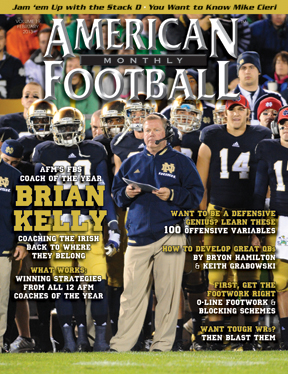Article CategoriesAFM Magazine
|
AFM’s College Coaches of the Year for 2012by: David Purdum© More from this issue AFM’s FBS Coach of the Year Brian Kelly After decades of frustration, Kelly led the Fighting Irish back to national prominence. It was not a pleasant environment, but Brian Kelly had been there before. He knew what to say. In 2001, Kelly led Grand Valley State to an undefeated season and its first appearance in the Division II championship game. It was also Kelly’s first national championship game as a head coach, and it would end in heartbreak. Grand Valley State led for much of the game and scored to go up 14-10 with 2:46 to play. But North Dakota State drove 80 yards, converting a fourth down with a 58-yard pass to set up the winning touchdown run with 38 seconds to play. ”Win or lose, we are a better football team for being in this game,” Kelly told reporters after the lo....The full article can only be seen by subscribers.
|
|
|||||||
| HOME |
MAGAZINE |
SUBSCRIBE | ONLINE COLUMNISTS | COACHING VIDEOS |
Copyright 2026, AmericanFootballMonthly.com
All Rights Reserved





